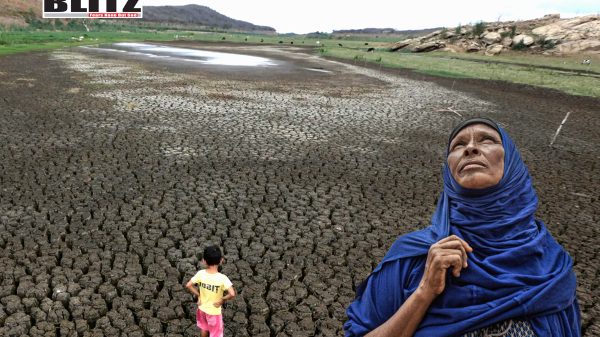Africa’s climate crisis demands global action and support
- Update Time : Saturday, November 23, 2024

Africa, though contributing minimally to global greenhouse gas emissions, finds itself on the front line of the climate crisis. The continent endures some of the harshest impacts of climate disruptions, losing up to 15 percent of its gross domestic product (GDP) annually due to climate-related challenges. This alarming figure underscores the profound economic and social toll of climate change on a region already grappling with poverty and inequality. At the recent COP29 climate conference in Azerbaijan, African leaders reiterated the urgency for decisive global action to address this escalating crisis.
Recent climate events have amplified the vulnerability of African nations. Rising sea levels threaten coastal regions in West Africa, causing displacement and infrastructure damage. In East Africa, prolonged droughts have devastated crops and livestock, triggering a severe food security crisis. These erratic and intensifying climate patterns jeopardize the livelihoods of millions of farmers and destabilize economies heavily reliant on agriculture.
In 2023 alone, climate-related disasters pushed an estimated 14 million Africans into poverty. This stark statistic highlights the urgency of addressing the crisis. Unlike wealthier regions, African nations lack the resources to adequately mitigate or adapt to climate impacts, making them particularly susceptible to its devastating consequences.
Africa’s reliance on climate-sensitive sectors such as agriculture, fishing, and tourism exacerbates the issue. For instance, farmers in the Sahel region report shorter, more intense growing seasons, leading to reduced crop yields and heightened food insecurity. These pressures, compounded by existing socio-economic vulnerabilities, push many communities further into extreme poverty.
Another critical dimension of Africa’s climate crisis is the growing migration and displacement caused by climate events. Millions are forced to leave their homes in search of food, water, and livelihoods. Without immediate action, these migrations will intensify, creating humanitarian crises and straining the infrastructure of neighboring regions. The ripple effects of such instability underscore that Africa’s climate crisis is not confined to the continent-it is a global issue with far-reaching implications.
In response to these challenges, African leaders and climate advocates have proposed actionable strategies to address the continent’s vulnerabilities and promote sustainable growth. These strategies, if supported globally, could transform Africa into a leader in green energy and climate resilience.
One of Africa’s key strengths lies in its abundant natural resources essential for clean energy technologies. Minerals like lithium, cobalt, and copper, which are critical for batteries, wind turbines, and solar panels, are found in abundance across the continent. By harnessing these resources responsibly, African nations can transition from environmentally damaging extractive industries to sustainable green economies. This shift not only positions Africa as a vital player in the global clean energy market but also mitigates the economic risks posed by climate disruptions.
In addition to its mineral wealth, Africa’s vast forests and unique ecosystems offer immense potential for carbon sequestration. Conservation and reforestation initiatives, particularly in the Congo Basin, are crucial for global climate stability. Protecting these forests not only captures carbon but also preserves biodiversity, sustains rural livelihoods, and safeguards critical water sources. Nature-based solutions provide a holistic approach to addressing climate challenges while enhancing ecological and social resilience.
At COP29, African leaders highlighted the urgent need for adequate financial resources to build climate resilience. Current global commitments fall woefully short of what is required. Africa needs more than $100 billion annually for climate adaptation, yet only $11.4 billion was committed in 2019-2020. Bridging this funding gap is critical for investing in resilient infrastructure, early warning systems, water management, and food security programs.
Africa’s renewable energy potential is another area of immense promise. From the solar-rich deserts of North Africa to the hydroelectric capacity of sub-Saharan rivers, the continent has the resources to lead a green energy revolution. Investments in renewable energy infrastructure can simultaneously reduce emissions and address energy poverty, as over 600 million Africans currently lack reliable electricity. Expanding access to clean energy would not only improve living standards but also drive sustainable economic development and reduce dependence on fossil fuels.
While Africa bears the brunt of climate change, its contribution to global emissions is minimal. The responsibility for mitigating the crisis rests heavily on developed nations, which are historically the largest contributors to greenhouse gas emissions. These countries have a moral and practical obligation to support Africa’s climate adaptation and green transformation efforts.
Financial commitments from high-income nations must be scaled up and delivered transparently to ensure they reach the regions most in need. Beyond funding, developed countries can share advanced renewable energy technologies and expertise to accelerate Africa’s clean energy transition. Such support would not only empower Africa to address its energy challenges but also benefit the global fight against climate change.
The consequences of inaction are dire. Climate disruptions in Africa will exacerbate global instability, creating economic, political, and humanitarian challenges that transcend borders. Supporting Africa’s climate resilience is therefore not just an ethical imperative but a strategic necessity for global stability and environmental health.
Africa’s climate crisis is one of the defining challenges of our time. The devastating impacts of climate change are already unfolding, with millions of lives, ecosystems, and economies at risk. The strategies proposed by African leaders at COP29 offer a roadmap for a resilient and sustainable future. However, these initiatives require substantial global support to succeed.
The international community must recognize that addressing Africa’s climate challenges is integral to securing a stable and sustainable future for all. By investing in Africa’s green transformation, promoting technological cooperation, and fulfilling financial commitments, the world can turn the tide against climate change and build a more equitable and resilient global community.
Africa’s fight against climate change is a shared responsibility-one that demands urgent and collective action.
Please follow Blitz on Google News Channel













Leave a Reply